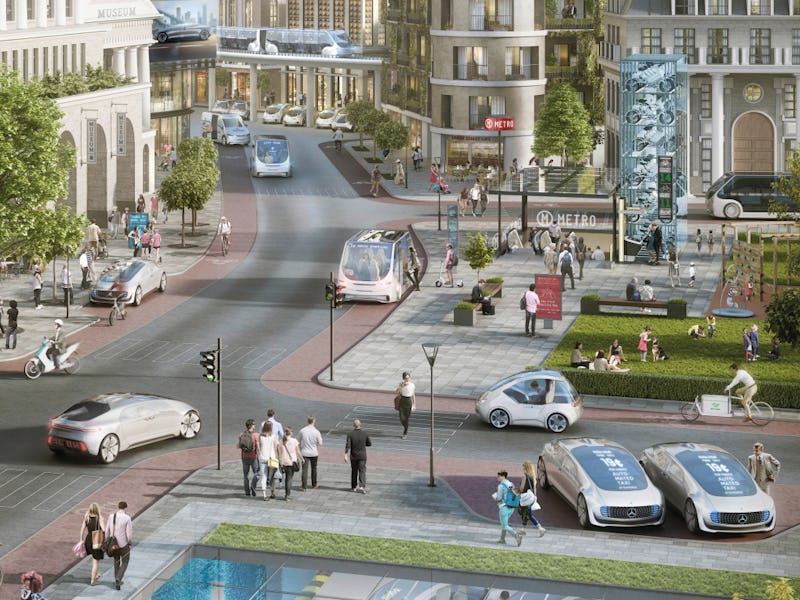Car maker Daimler is joining forces with engineering company Bosch to bring Uber-like autonomous car sharing to cities by early next decade, the two firms announced Tuesday. The end goal is a driving system where passengers inside a specified city zone can hail an autonomous car using their smartphone.
The project is ambitious. Daimler and Bosch specify that the pair is aiming for both SAE level four and five autonomous driving on this timescale. Level five is the holy grail of this technology: it means the car independently driving without any human intervention. The two companies’ goal is to allow people without a driver’s license to use the service, which means the car cannot expect the passengers to take over in an emergency.
“We believe that with this partnership announced today, we will be able to provide fully automated and driverless driving (SAE Level 4/5) in the urban environment at a much faster rate than before,” a Daimler spokesperson tells Inverse.
A diagram showing a sample journey using the autonomous system to move around a city.
Daimler owns a number of brands, including Mercedes-Benz and Smart, and pre-release mockups of the service show a Mercedes-Benz that bears a striking resemblance to a previously-demonstrated concept car. The F 015 is a four-seater autonomous vehicle aimed at letting passengers interact with each other. The car’s interior more closely resembles a room than a traditional car, and the front seats can turn to face the rear passengers.
It’s an exciting prospect of how the system could work, but Daimler’s spokesperson tells Inverse that the car in the mockup is just for illustrative purposes. At this stage, the company is focusing on the development of the technology, and no decisions have been made about which Daimler brand the system will fall under.
Daimler is one of many companies that are developing autonomous vehicles. The California DMV has issued 27 permits to companies for testing autonomous driving technologies within the state, a list that includes Mercedes-Benz and Bosch.
Tesla, another entry on the list, wants to achieve cross-country autonomous road trips by the end of this year. The company is using its Autopilot semi-autonomous system as a base level, with a planned software update set to enable full autonomy for Hardware 2-based cars that have been shipping since October.
Another company on the list, Volkswagen, has a plan that more closely resembles Daimler and Bosch’s. Moia, a company announced in December that sits under the VW group brand, plans to operate a ride-sharing service that includes autonomous driving as part of its long-term plan. The company aims to start a pilot fleet of autonomous vehicles by 2020, with a small fleet running by 2021.
Daimler has not placed a fixed year on its plans, but with a general goal of launching early next decade, it could find itself joining a field that includes players like Moia and Tesla.
